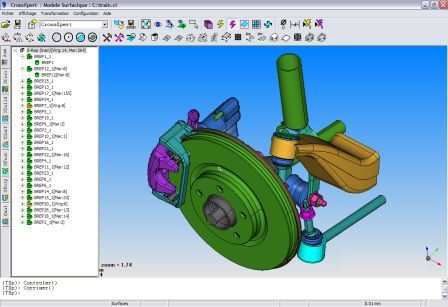- Join our Team
- Resources
-
Account
- |
- Cart
- EN FR
Datakit offers a new option for accessing CrossXpert, its advanced technology for CAD data conversion

March 23, 09
CrossXpert is Datakit’s conversion modeler. Featuring powerful integrated tools that analyze and automatically repair CAD models, it embodies all the experience acquired by Datakit in the realm of CAD data exchange.
CrossXpert meets the needs of manufacturers exchanging large volumes of heterogeneous CAD data from multiple sources and often too flawed for use “as is”. Recipients usually have the choice between correcting these files before they can be opened or adapting them so that the target application can use them.
With the first solution, the errors are generally linked to flawed initial design work or incompatibility between systems (notably because of differences in tolerance values). With the second solution, users will supply less data to the applications, typically simplifying or thinning the data in their CAD models for applications like simulation and manufacturing.
To enable manufacturers to derive the full benefit of their conversion modeler, Datakit is offering a new monthly subscription scheme for CrossXpert. This offer is tailored to meet the needs of manufacturers who are impressed by the product technology but do not have the investment budgets available for an acquisition in the short term.
Sales director Michel Gille explains: “Our customers realize that CrossXpert delivers rapid ROI. With the monthly subscription package we are effectively bringing them an alternative way to access a technology that pays back quickly, without denting their capital investment capability. Our subscription has three components: a 3-year CrossXpert license, the customer’s chosen interfaces, and the subsequent updates, maintenance and telephone hot-line. We recommend one day’s training to get users up to speed in best practices. CrossXpert is very easy to get to grips with”.
The subscription approach is an alternative to the existing one-time payment and on-demand conversion services that Datakit has been offering for several years. The scheme is also Datakit’s response to the budgetary constraints brought about by the current economic downturn.